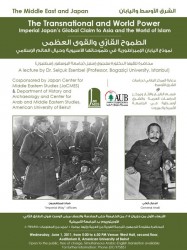| Date / Time | 1 June 2011 (Wed.) 17:00-18:30 |
|---|---|
| Venue | West Hall, second floor, Auditorium B, American University of Beirut |
| Language | English-Arabic simultaneous interpretation available |
| Organized by | Japan Center for Middle Eastern Studies(JaCMES) |
| Jointly sponsored by | The Center for Arab and Middle Eastern Studies, American University of Beirut |
| For further information | Japan Center for Middle Eastern Studies - Phone (01) 975851 |
| Open to the public, free of charge |
- Dr. Selcuk ESENBEL (Professor of Bogazici University, Istanbul, Turkey)
- “The Transnational and World Power: Imperial Japan’s Global Claim to Asia and the World of Islam”
The abstract
Between 1868 and 1945, Japan turned an Asianist face toward the Muslims of the world in the quest for Asian reawakening.
The pre-war mastermind of Japanese Pan-Asian thought Ōkawa Shūmei argued that Japan should form a partnership with the political energy of nationalism with Pan-Islamist discourse in the contemporary map of the World of Islam was to serve as an“international”against Western imperialist and colonialist hegemony.
The military leader of the Imperial Way (kōdō-ha) clique of young Japanese nationalist officers General Araki Sadao argued that Muslims in the Chinese mainland were part of the international citadel against the Soviet Union and the Communist threat. The paper aims to decipher the history of Japanese involvement the Muslim hemisphere of Eurasia in terms of the inception of transnational networks, discourses, and strategies of the twentieth century in global politics and world power.
The talk will introduce the author's recent publication Japan, Turkey, and the World of Islam, The Writings of Selcuk Esenbel, Leiden: Brill Global Oriental, 2011.

Dr. Selçuk Esenbel
Born in Washington D. C. as the child of a diplomatic couple in the Embassy of the Republic of Turkey, Ayşe Selçuk Esenbel grew up in Turkey, Japan, and the United States.
She completed her undergraduate degree in History in the International Christian University (Japan) and George Washington University (USA).
She received her master’s degree from the Department of Japanese Language and Linguistics at Georgetown University (USA) in 1969 and a PhD in Japanese history from Columbia University (USA) in 1981. From 1982 to 1985, she was assistant professor at Bogaziçi (Bosphorus) University and became full professor in 1997, serving as Chair of the Department of History at Bogazici University between 1994 and 2003.
She has not only helped educate many junior scholars in her country but has also been actively promoting exchange between Turkey and Japan.
Esenbel helped establish the Japanese Studies Association in 1993 and consolidated the organization as a Board Member. She became its third president in 2002 and has since contributed to academic and intellectual exchange between the two countries through the organization and hosting of various conferences and lectures.
Esenbel is the director of the Asian Studies Center and the recent Asian Studies MA program which includes Japan and China majors as well as the Confucius Institute at Bogazici University.
She contributed to the establishment of a Japanese language department at Ankara University in 1986, the Japanese language teaching program at Bogazici University in 1988, and the Japanese Studies Certificate in 2002. Her major publications in English include Japan, Turkey, and the World of Islam, (Brill Global Oriental, 2011) Even the Gods Rebel: The Peasants of Takaino and the 1871 Nakano uprising in Japan (Association for Asian Studies 1998) and The Rising Sun and the Turkish Crescent (co-authored) (Bogazici University Press, 2003).
Her articles in Japanese are published in such books as Kindai Nihon to Toruko sekai and Ibunka rikai no shiza: Sekai kara mita Nihon, Nihon kara mita sekai. Her articles in English are published in journals such as the Bulletin of the School of Oriental and African Studies (UK), and the American Historical Review (USA).

